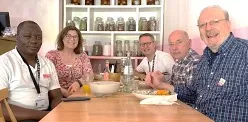NMU BIology Professor Neil Cumberlidge recently attended a week-long freshwater crab workshop at the Museum für Naturkunde (Natural History Museum) in Berlin, Germany. He joined international colleagues working on new collections of freshwater crabs resulting from the group's biological surveys of three central and West African biodiversity hotspots in Cameroon, the Democratic Republic of the Congo and Sierra Leone.
The more than 100 unknown newly-collected specimens were first identified by the group, then photographed in the museum's microphotography facility, after which small amounts of tissue were removed from selected specimens for DNA sequencing in the museum's molecular labs.
The preliminary results indicate that the collections include at least six new species in three different genera. Cumberlidge said this will also prompt taxonomic reorganizations that recognize two new genera of freshwater crabs. In addition, the results of the microscopic study of the mandibles, or mouth part, of these specimens is laying the groundwork for an important publication on the taxonomic significance of the mandibular palp, which will affect not only freshwater crabs, but also impact marine crabs in the rest of the world.
“This was a very productive international research meeting between scientists from four countries that will result in at least eight new publications in the near future,” said Cumberlidge.
This research in three unexplored parts of Africa's great rainforests is proving to be an extremely productive area of research.
“I am particularly pleased that we are able to involve African students in the fieldwork in Cameroon, the Democratic Republic of the Congo and Sierra Leone because these young people will eventually become the next generation of African scientists,” said Cumberlidge.
He was joined at the workshop by colleagues Pierre A. Mvogo Ndongo, who had travelled from Douala, Cameroon in Central Africa, and Paul Clark from The Natural History Museum in London in the United Kingdom. Thomas von Rintelen of the Museum für Naturkunde hosted the meeting.

